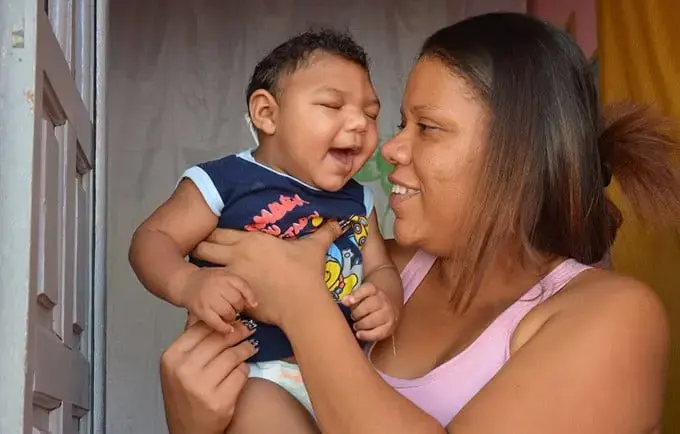The distance and the harsh route between Venezuela and Brazil didn’t scare Yennyfer Espizona, 30 years old. Mother of three young kids, she crossed the border two times. First, almost a year ago, with the youngest one, 4 years old. After she got shelter in the city of Boa Vista, she came back for the others, 8 and 10 years old. She made all the way by getting a bus, taking rides and on foot.
“It was very good in Venezuela, before. I was working and studying. It was a wonderful life. Then, the economy got worse. There was no money to buy even a bread. I thought the best choice I had was to take away my child”, she recalls.
Yennyfer had still another motivation: her oldest daughter, 10 years old, was diagnosed with autism. Without proper medication, she becomes aggressive and has difficult to interact with other kids. “In Venezuela, the treatment was very expensive. She wasn’t going to school anymore, neither had access to the medicine that, here, are available for free. Now, she is calmer and happier”, celebrates the mom.
The team of the United Nations Population Fund in Roraima helped Yennyfer to find the proper treatment for her kid in the public health system, and also to deal with personal issues, like the violence that haunted her life. She was one of the 80 people that participated in a Self Defense project, developed during three months in partnership with the Federal University of Roraima, especially with violence victims, women and young people.
According to Patricia Ludmila Melo, gender-based violence specialist from UNFPA in Roraima, projects like the Self Defense’s one promote changes not only in the safety of the most vulnerable migrants and refugees, but also in a way of facing and identifying common situations in the life of these people. “We spent two hours talking about sexism, racism, violence and social inequality. The United Nation Population Fund gave all the support and coordinated the meeting groups”, she says.
Yennyfer was one of the best students. During the group reunions, she was able to open up about the things that bothered her, to identify all the forms of violence, to protect herself in a case of physical harm. She even participated in the project’s final presentation, with a demonstration of the techniques learned. “I have learned to act in a risk situation and to deal with panic attacks. I have learned to have self-esteem”, she says.
Yennyfer and her three kids were in the list for an opportunity of Interiorization, promoted by Operação Acolhida. After documentation and immunization procedures, migrants and refugees are available to travel to other Brazilian states where they can obtain shelter and work. Until now, more than 12 thousand people have been transferred to 17 different states.
“I hope I can get a place, I want a job to guarantee the future of my kids and, later, be able to send some help to my family in Venezuela”, she told UNFPA.
The Interiorization initiative is voluntary, which means it’s for all people who want to participate. The destination details are explained in advance. Before every trip, UNFPA works to spread information about women’s, girl’s and LGBTI’s rights in Brazil, and also give lectures about how to move on, keeping dialogues and monitoring the situation after the migrant and refugee people leave Roraima.
After a few weeks of waiting, Yennyfer and her family were transferred. She now lives in Manaus, Amazonas.



